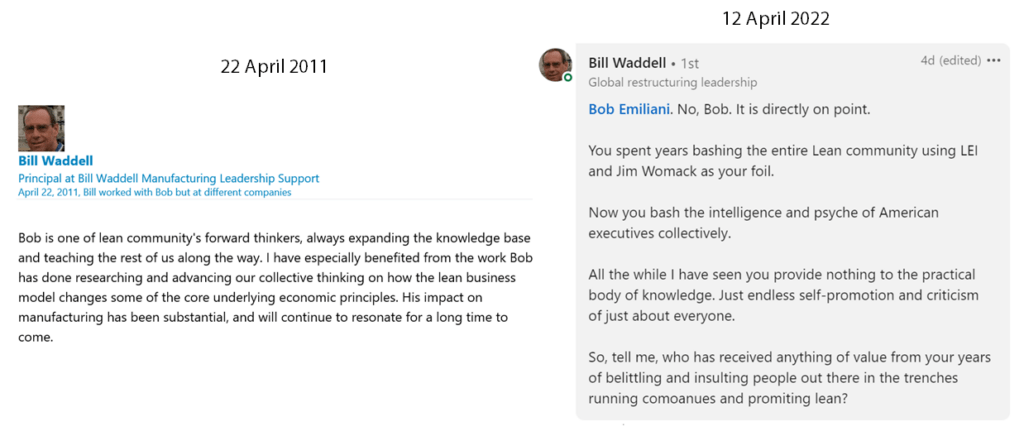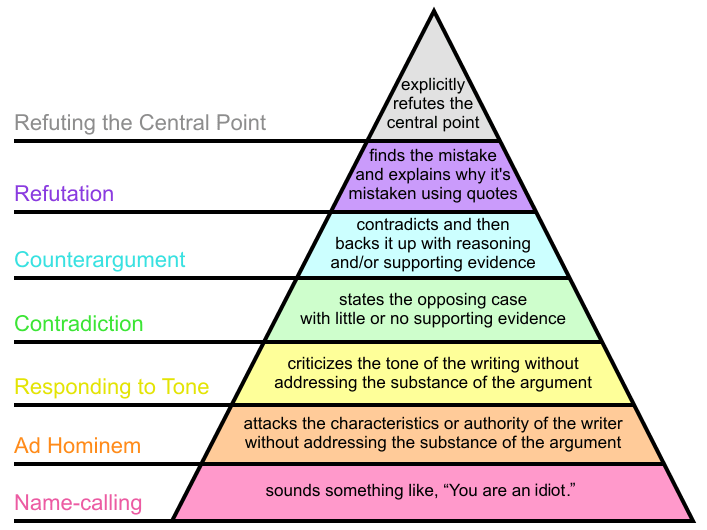For a number of years, I have faced displeasure from some of the big names in Lean-world for my writings about Lean leadership and Lean management, and its successful competitor classical management (informed by the Institution of Leadership and the System of Profound Privilege). These people, ten or so in number (likely more), are mostly American, but some hail from other lands.
My fundamental position in research and writing is to get to the truth — to demystify, challenge orthodoxy, and expose what is really going on –imperfectly, for sure. Still, it seems I am effective at getting to the truth given the displeasure and defensiveness that my work generates among these fine people.
The root reasons why they are displeased is unclear to me because most don’t want to talk to me, though they are happy to complain about me among themselves. They have scorned me and would rather whine (“complain” if you prefer). Is referring to them as “whiners,” name calling? Is it an ad hominem attack? No, for three reasons. First, I am referring to a group of people, not specific persons. Second, the term “whiner” accurately describes their persistent defensive behavior. Third, I offer fact-based arguments while in their claims they offer no counterargument.
I have received messages such as these from prominent Lean people:
- I have received several private messages stating your writings and posts are a cancer and totally counterproductive.
- Many people don’t like your behavior.
- You are damaging your reputation.
- You’re embarrassing yourself.
- What are you doing?
- You think you’re the only one who knows Lean.
- Your approach to persuading people is toxic.
- About once a month people ask me what’s wrong with you?
- Your work is not original, practical, or inspiring.
- You hide behind the walls of academia.
- You think you know it all.
- All you do is self-promotion.
- You hurl criticism and insults.
- You bash LEI, Womack, executives, and consultants.
- You should delete all of your LinkedIn posts.
The comments, every one of them, are idiotic. My interest is to it is to educate so that people can improve, not to know it all or seek fame or fortune. I am driven by curiosity, obviously much more so than these folks who give me feedback.
As you might expect, I periodically receive unsolicited advice on what I should and should not do. These people desperately want to change me; a demand that I acquiesce to their authority and exhibit the requisite loyalty and purity. One person recently told me that the singular reason I should listen to him (meaning, conform to his advice) is because of his “status and experience” as a Lean pioneer. I can only speculate as to what disturbs these people, driven by a warrior-like mentality of exclusion and degradation, and a great intolerance for diverse experiences and diverse thinking. Some possibilities may be:
- My work diminishes their status, power, or influence.
- My work or influence harms their Lean business.
- My work contradicts or disproves their work or their advice.
- Their customers find my work persuasive, which forces them to defend their work or explain away me or my work as irrelevant.
- My ability to successfully swim in two lanes, industry and academia.
- They almost certainly feel “he’s not one of us,” and that I should know my place.
- Their failure to understand, and inability to control, a freethinker; an iconoclast.
- Perplexed by the duality of Lean advocate and Lean critic.
These whiners plateaued long ago, so firm in their ideology that it is a barrier to my objective scientific studies. They stopped moving forward while I moved ahead, thereby upsetting the status quo. They apparently think my work to clarify and expand Lean knowledge is counterproductive. My work must, in some way or another, cause them to do things that they would rather not do. It is clear from their complaints that diversity is permitted when it strengthens the Lean orthodoxy and groupthink, but is quashed and ignored when it weakens it. They don’t want me to be me, they want me to be like them, by applying social pressure and acts of domination. They truly believe that would be best for all. How foolish of them to think that.
They say odd or irrelevant things, and proffer numerous fallacious arguments (especially this one and this one), such as:
- Have you ever been to the gemba?
- Have you ever spoken to a CEO?
- Have you ever been a CEO?
- Do you actually talk to people on the front lines?
- You don’t do enough “likes” of other people postings.
- Do you know anybody at Toyota?
- You should stop bashing leaders.
- You think you know it all.
- People don’t like your tone. You need to be more positive.
- You should focus on X instead of Y.
- Have you ever led kaizens?
- You think you know more than Jim Womack.
- Why don’t you write about Barry-Wehmiller or Danaher, or ________?
- You think if people have mentally studied a subject [read a book], they can understand it.
These comments too, every one of them, are idiotic.
The tactics they use to disparage and discredit me have been used for millennia. Rather than rigorously critique my published works or posts (refutation or counterargument with supporting evidence), they feebly attack my credibility and contradict my work with no supporting evidence. That indicates they lack the intellectual strength, or the time or interest, to rebut or disprove my work. The best they can do is mount an emotional response and hope that I will feel so diminished by their attacks that I will quit doing what I do. It is too late for that.
I am a “Lean outsider” by choice because it allows me to freely pursue my interests. As I have said many times before, I do this for the benefit of the Lean community — clearly not for my benefit given the hostility and resentment that I receive. Feedback from the Lean community, overall, has long been positive. My work makes people think. Those who whine or get mad are, of course, not thinking.
I have noticed these five things about those who are displeased with me:
- They idolize authority figures. Consequently, they get upset when I point out problems with authority figures and their work.
- They want me to think, act, and do as they do.
- They appear to be fixated on maintaining status.
- They are all white men (some of whom act like little boys bullying for Lean playground dominance).
- They appear to be anchored by traditions; preconceptions and cognitive biases, and therefore unreceptive to new and better information.
- Anti-intellectual.
These fit nicely together — authority, status, men, stagnant, anti-intellectual. And here we thought the best Lean leaders are humble and reflective learners. I guess not. But hypocrisy is not the real problem here. That is merely a side show. The real problem is that they and many others ignore the case that CEOs have long made against Lean management. That is, in fact, the cancer that is totally counterproductive to the advancement of Lean management which I, like so many other have fought for and continue to fight for. We are all on the same team. The only difference is in the method: groupthink versus freethinking. These good and intelligent people cannot accept that.
I find this all very amusing. Most people appreciate the intellectual rigor that I bring to Lean. They have told me:
- You are brave to speak up.
- Thank you for sharing your work and insight and giving me cause to think and learn.
- You are doing terrific work my friend!
- Constructive critique is healthy and helps move knowledge forward.
- You say what a lot of people are thinking.
- Your skills at “forcing” hansei on your readers is very effective.
- Don’t let what other people say keep you from doing your work.
- They’re just jealous.
- Ignore the concrete heads.
- Thanks Bob for sharing it with us. Learning is exciting with your posts.
- You are THE voice of truth in the Lean community.
- You “call ’em as you see ’em” — all too rare.
- You’re helping us in better understanding why efforts to real improvement are so tough.
- No doubt you are a challenge to many, that is why I like to hear your voice.
- Keep it coming
• • • • • • • • • • • • • • • • • • • • • • • •
Note: Their complaining stems from my freethinking research, analyses, critiques of Lean, and challenges to Lean movement leaders and the Lean community. My work follows the ethos described in this quote:
A real irony is that respect for people requires that people feel the pain of critical feedback. If we do not give people accurate feedback based on real behavior they are not growing and we are not respecting them. – Akio Toyoda
The Toyota Way to Leadership, J. Liker and G. Convis, 2012, p. xii
I always welcome criticism of my work in the form of well-organized written refutation or counterargument with supporting evidence, as was taught in school. Learn more here and here on how to disagree.
• • • • • • • • • • • • • • • • • • • • • • • •
Update: Below is an example of the feedback you get when you fall in line with your peer group (left side), and what happens when you start to dig deeper and ask questions to better understand what is going on with Lean, the Lean movement, leadership thinking, leaders’ preconceptions, etc. (right side). My twin efforts to support and critique Lean demonstrate a great passion for continuous improvement, whereas defensive routines such as Bill Waddell’s, and others who are similarly upset with my work, suggest a different locus of interest.



